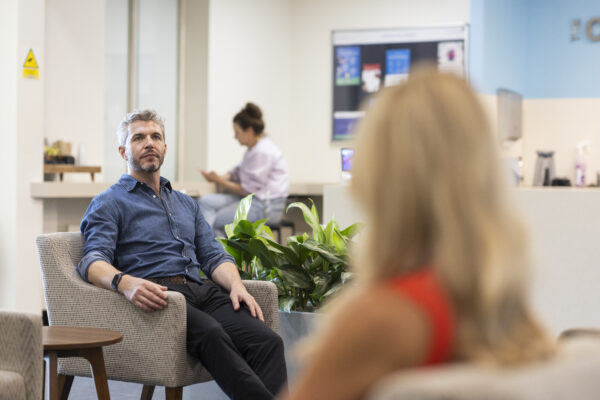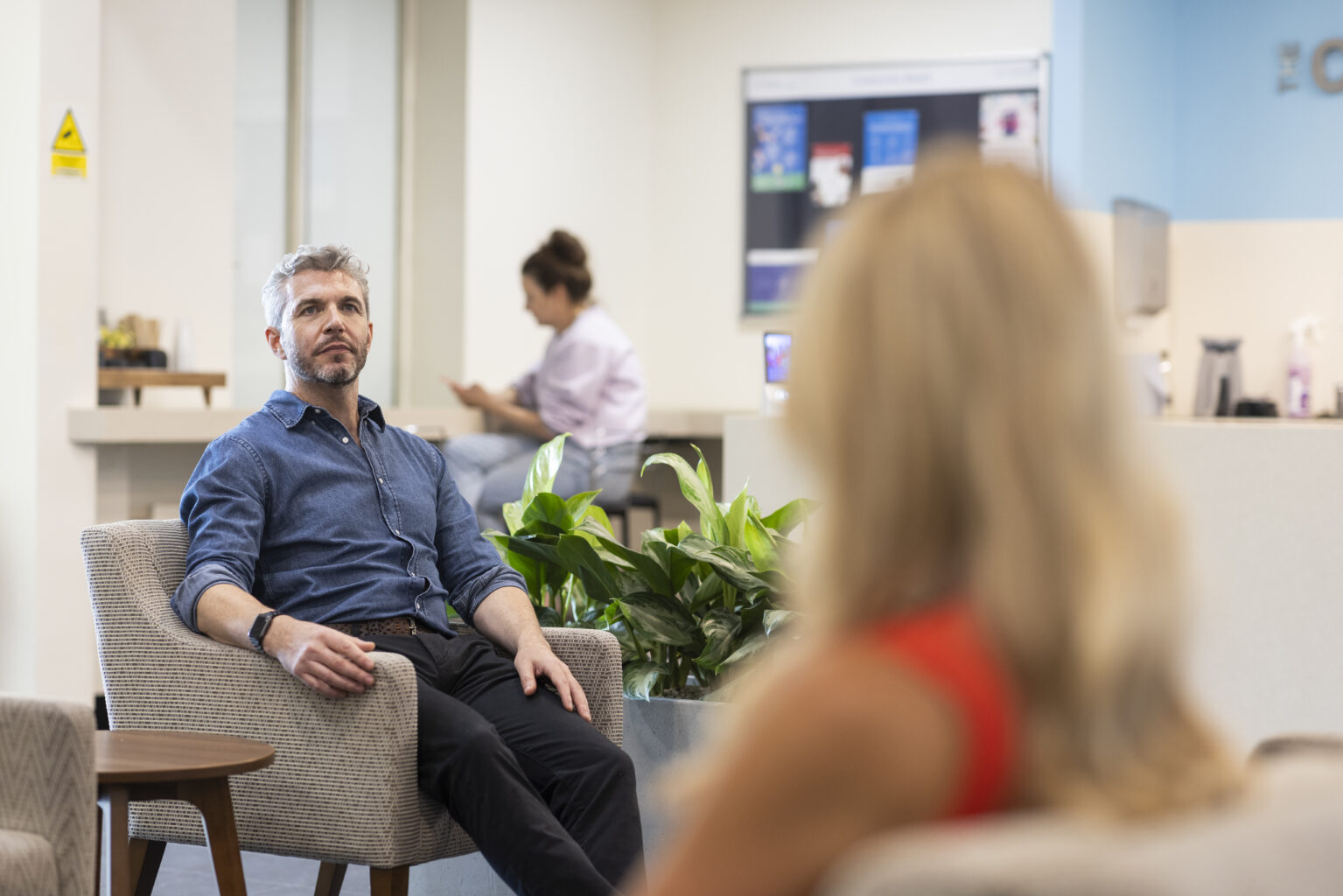Contact number: 020 7806 4060
What is Varicocele Surgery?
Varicocele surgery, or varicocelectomy, involves sealing or removing enlarged veins in the scrotum to improve blood flow and reduce associated symptoms. This procedure is commonly recommended for patients experiencing:
- Pain or discomfort caused by varicoceles
- Infertility or reduced sperm quality linked to varicoceles
- Noticeable swelling or changes in the appearance of the scrotum
The surgery can be performed using minimally invasive techniques such as laparoscopic or microsurgical approaches to promote faster recovery and minimise scarring.
Located in St John’s Wood (NW8), our hospital provides varicocele treatment with state-of-the-art facilities and personalised care.
Varicocele Surgery at St John & St Elizabeth Hospital
At St John & St Elizabeth Hospital, we provide a comprehensive range of urology treatments, including varicocele surgery. Our skilled consultants work closely with patients to deliver tailored care and effective results.
Why choose us for varicocele surgery?
- Specialist Urologists: Our consultants are experienced in diagnosing and treating varicoceles with advanced surgical methods.
- Minimally Invasive Techniques: We use modern approaches such as laparoscopic and microsurgical varicocelectomy to ensure precise treatment and a quicker recovery.
- Comprehensive Care: From consultation to follow-up, we support you every step of the way.
- Accessible Location: Based in NW8, we serve patients from Hampstead (NW3), Kilburn (NW6), and the wider London area.
We are committed to improving your comfort and overall health through expert and compassionate care.
Consultants
How Much Does Private Varicocele Surgery Cost?
£3,960
Private Varicocele Surgery costs £3,960 at St John & St Elizabeth Hospital.
The price shown includes all hospital related costs associated with your treatment, from admission to discharge. The price does not include the cost of consultation, diagnostics, or the surgeon or anaesthetist fee.
Our hospital fee is guaranteed at the price quoted and valid for one month from the date issued, subject to pre-assessment.
Appointment and Treatment Plan
Initial Consultation
The journey begins with a thorough consultation to assess your symptoms and determine the suitability of varicocele surgery.
Personalised Treatment Plan
A customised treatment plan will be developed based on your condition, outlining the specific details of your surgery and recovery process.
Pre-Surgery Assessment
A comprehensive pre-surgery assessment ensures you are physically ready for the procedure.
The Procedure
The surgery will be performed using the method best suited to your case. In some cases, x-ray dye may be used to improve the clarity of images during the procedure, allowing for more precise navigation and treatment of the veins. Advances in varicocele surgery, such as laparoscopic and microsurgical techniques, offer higher success rates with minimal complications.
Aftercare and Recovery
Post-surgery, you will receive detailed aftercare instructions, including guidance on managing pain, caring for the surgical site, and when to resume normal activities. Follow-up appointments will ensure the best results.
Frequently Asked Questions About Varicocele Surgery
St John & St Elizabeth Hospital is located in St John’s Wood (NW8), a well-connected area of North West London. We are conveniently accessible for patients from Hampstead (NW3), Kilburn (NW6), and beyond.
By Tube:
- St John’s Wood station (Jubilee Line) is just a 5-minute walk from the hospital.
- Finchley Road (NW3) and Kilburn stations (NW6) on the Jubilee Line provide excellent connections.
By Bus:
- Wellington Road: Routes 13, 46, 82, and 113 stop near St John’s Wood Underground Station, just a short walk from the hospital.
- Circus Road: Routes 46 and 187 stop close to the hospital’s Circus Road entrance.
- Abbey Road: Routes 139 and 189 stop near the junction where Grove End Road becomes Abbey Road, providing easy access.
Major Roads:
If you’re travelling from NW3 or NW6, major routes such as Finchley Road or Kilburn High Road offer a direct approach to the hospital.
Our hospital ensures convenient access for patients across London, particularly those in NW8, NW3, and NW6 postcodes.
Varicocele surgery typically takes 30 to 60 minutes, depending on the surgical technique used.
Varicocele surgery is performed under local or general anaesthesia, so you will not feel pain during the procedure. Some mild discomfort or swelling may occur afterwards but usually resolves within a few days.
Recovery following varicocele surgery is generally quick, with most patients returning to light activities within a few days. Strenuous activities should be avoided for one to two weeks. Full recovery may take up to four weeks.
Immediate Post-Op Care
You may experience mild swelling and discomfort, which can be managed with pain medications. Proper care of the surgical site is crucial to ensure that the blood vessels heal correctly and to prevent complications. It is important to avoid heavy lifting or strenuous activities for several weeks. Applying ice to the surgical area can help reduce swelling.
Follow-Up Care and Physical Therapy
Regular follow-up visits with your surgeon will be scheduled to monitor your recovery. In some cases, varicocele embolisation may be recommended as a follow-up procedure to ensure the veins remain blocked and to prevent recurrence. These appointments are vital for ensuring that the surgical site is healing properly and that any complications are caught early. In some cases, light exercises may be recommended to promote healing and maintain testicular health.
While varicocelectomy has a high success rate, there is a small chance of recurrence. Your surgeon will discuss strategies to minimise this risk during your consultation.
There are a few common surgical procedures for varicocele surgery:
- Open Surgery: A small incision is made in the groin to access and repair the affected veins.
- Laparoscopic Surgery: Small incisions are made, and a camera is used to guide the surgical instruments. This method is advantageous as it requires fewer veins to tie off during surgery, making it less invasive.
- Percutaneous Embolisation: A catheter is used to block blood flow to the affected veins, causing them to shrink.
Varicocelectomy surgery typically lasts about 1 to 2 hours, depending on the approach used.
In addition to surgery, there are several alternative treatments available for varicoceles, including:
Embolisation
Embolisation is a minimally invasive procedure designed to block the affected vein and redirect blood flow into healthy veins. This can be achieved through various techniques:
- Coil Embolisation: A small coil is inserted into the affected vein to obstruct blood flow.
- Balloon Embolisation: A small balloon is used to block the vein.
- Sclerotherapy: A special solution is injected into the vein to block blood flow.
Embolisation is often considered an alternative to surgery due to its less invasive nature and shorter recovery time. However, it may not be suitable for all patients, and the risks and benefits should be carefully evaluated before proceeding with this treatment option.
The symptoms of a varicocele can vary widely but often include:
- A feeling of heaviness or swelling in the scrotum
- Pain or discomfort in the testicles
- Visible swelling of the veins in the scrotum
- Low sperm count or poor sperm quality
Diagnosing a varicocele typically involves a physical examination where a healthcare provider will check the scrotum and testicles for signs of swelling or tenderness. Imaging tests, such as an ultrasound, may also be used to confirm the diagnosis. Early diagnosis is crucial for effective treatment and preventing complications.


